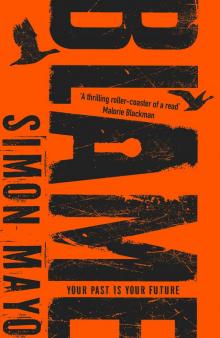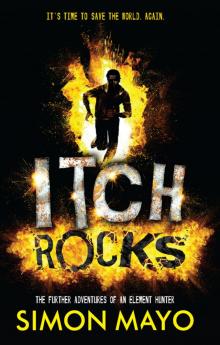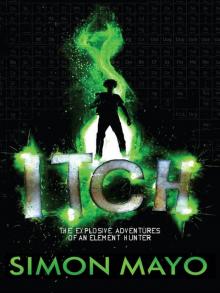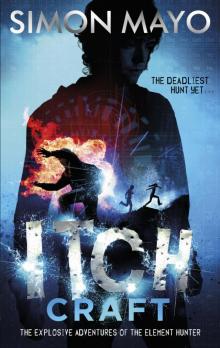- Home
- Simon Mayo
Itch Rocks Page 2
Itch Rocks Read online
Page 2
“If they want to carry on walking, we can cover that. So much has changed for them, it would be good to keep some things the same. We can always change the routine if anyone is unhappy.”
The parents had agreed, and so the twice daily “run” began.
Initially, both Itch and Chloe had been very conscious of all the attention, and laughed and cringed with embarrassment all the way. After all, this level of security was normally reserved for prime ministers, presidents, and royalty. But after two weeks, the routine had come to feel almost normal.
Tina’s radio crackled, and Colonel Fairnie’s voice came through: “School run, your route is clear.”
“Roger that,” replied Tina. “OK, let’s go.”
The two agents stationed at the front door, Sam Singh and ex-policewoman Kirsten Jones, opened it and stepped out. Casually dressed in jeans and leather jackets, they looked like a couple going to work or shopping in town, not agents from MI5 on a security detail. Itch knew better though. He knew that their clothing had to conceal a Glock 17 pistol. All the agents carried firearms 24/7—another thing that upset Jude Lofte, who hated the idea of guns in the house. Itch thought it was pretty cool. He’d asked to examine one and been refused.
After ten seconds Tina called, “OK, Itch, Chloe, your turn,” and they walked out of the house.
The security team’s van, with Danny Ford, the youngest of Fairnie’s team, and Chris Lakeman, both ex-policemen, was idling in the middle of the road. As the Loftes headed down the hill, it followed a few feet behind them. Completing the procession, Tina left the house with Moz. They walked side by side on the other side of the road behind Itch and Chloe. Every few seconds one of them would turn and walk backward for a few steps, checking the surrounding area for anything out of the ordinary. Itch had originally assumed they’d all walk together, but Fairnie had vetoed that.
“Close protection is only used when the threat is, frankly, assassination. Here it is kidnap that we are preventing, so sixty-five feet is best.”
“You see, Chloe,” Itch had said grimly, “we’re not going to be assassinated. I told you everything would be fine.”
When they reached the golf course, the van peeled off. The route had been approved by Fairnie, even though it meant driving around and meeting the rest of the group on the other side. Crossing the golf course on foot was much quicker and meant they usually encountered fewer people. On the edge of one of the fairways they passed an impressive six-foot pile of wood, ready for Bonfire Night.
“I hope you’re not planning anything involving fireworks,” said Chloe, smiling. “You shouldn’t be allowed anywhere near them!”
“Yeah, that’s pretty much what Fairnie said,” replied Itch. “Which is a shame. I could probably put on quite a show.”
“I think that’s what they’re afraid of.”
They walked on, passing the eleventh green and its perfectly semicircular bunker. “I hate that first part of the walk,” said Itch. “I just feel watched all the time.”
“We are watched all the time,” Chloe pointed out. “You should know that by now.”
“Not just by the agents, but …” Itch waved his arms around, “by everyone. Out their windows, behind curtains. At school I can’t go anywhere without nods and winks and comments. No one really spoke to me before, but at least they weren’t scared of me. Now, as soon as they see Moz or Tina, they either flatten themselves against the wall to let me pass or they turn around and go the other way.”
“You might not have noticed,” said Chloe, “but some of the girls in my class actually follow you at lunch just to see if anything happens. Ever since you disappeared, they figured you were a spy or something. Apparently, loads of people thought you were dead. They saw us at the school jazz concert that evening, then we disappeared with Mr. Watkins. When none of us turned up for school, the rumors started. The principal couldn’t say anything because she didn’t know much either.”
“Yeah,” said Itch. “Jack told me that Potts started a What’s Happened to Lofte? Facebook group—most of the school was on it before Fairnie found out and got it taken down.”
The colonel and his team had managed to keep a pretty tight information blackout on Itch and element 126. Facebook and Twitter were under constant surveillance back in London, and any online discussion disappeared as soon as it had been uploaded. On the first day of the school run, one early-morning golfer had made the mistake of trying to film the unlikely procession on his phone. Five seconds later he was flat on his face in a bunker with his phone smashed by a five iron, courtesy of Moz Taylor.
Despite the information blackout though, everyone in town seemed to know that something had gone on, just not precisely what. They also understood that whatever had happened to Itch was serious; serious enough to involve people with firearms. The unfortunate golfer’s fellow players all noticed—and reported to their friends—that the agent had a gun inside his jacket.
A small group of golfers was watching them now, Itch realized, gaping at them like they were some sort of local tourist attraction.
“What are you waiting for?” he shouted. “Hoping I’ll get shot or something? Is that what you want?” The golfers looked away, embarrassed.
Itch picked up his pace. In front and behind, the security agents lengthened their own stride.
“Why are we hurrying?” asked Chloe. “You usually make this part last as long as possible.”
Itch and his sister often walked slowly on the way to school; with their home full of cameras and MI5 agents, it was the only time they could speak openly to each other without being overheard.
“I hate golf. I hate golfers. Stupid golf pants, stupid game,” said Itch.
Chloe said nothing but hurried after him.
As they approached the edge of the course, they spotted their cousin, Jacqueline Lofte, always known as Jack, walking up the hill. They called out to her and she crossed the road to join them, waving at the blacked-out van that was idling on the corner. A few feet behind, her own bodyguard jogged to catch up.
“Hi, you guys!” called Jack. She was fifteen, the same age as Itch, and almost as tall; the whole Lofte clan was taller than average. Her black hair had grown back since the radiation-induced close crop of the summer, but it was still short and pixielike, making her look a lot like Chloe. Her bodyguard fell in with Tina and Moz, who were waiting by the thirteenth green as the three cousins greeted each other.
“How are you getting on with your security?” asked Itch, nodding toward the young blonde woman in a tracksuit and baseball cap who had been accompanying his cousin.
“Rachel’s nice,” replied Jack. “Quiet, but that’s OK. And we’re used to having people stay over. Just not used to them following me everywhere.” Rachel Taylor was Jack’s bodyguard and had moved into her house. “But it is so weird not being able to walk around town without it becoming a major hassle for everyone. I went to do some shopping for Mum over the weekend, and Rachel had to go there beforehand. She radioed back just to say that the supermarket was OK!”
“We should keep going,” said Itch. “Our friends are looking nervous.”
Ahead, the two lead bodyguards, Sam and Kirsten, had stopped at a newsstand and were waiting for the Loftes to set off again. They were glancing from cars to pedestrians, checking for anything unusual.
“Come on, then,” said Chloe, and the trio set off down the main street. Five minutes later, the disjointed column of guards and pupils walked through the gates of the Cornwall Academy.
With temperatures set at freezing, the winds running at forty knots, and sleet and snow swirling around the helipad, a group of oil workers hurried into the galley. They were exhausted and hungry after a grueling six-hour shift and needed hot food and drink—fast.
They crashed through the doors, and the warmth and smells of the kitchen overwhelmed them. As they cheerfully shed their many layers of waterproofing, they noticed an unusual sight at the far table. The galley chef, an enormous
red-faced American by the name of George Sanders, had one of his colleagues face down in a pizza. Sanders’s chef’s apron and overalls strained to enclose his bulk as he twisted the tomato-and cheese-smeared face left and right on the table.
“You all right, George?” called one of the men.
“Hell, yes! Just meting out some chef’s justice!” Sanders smiled at the new arrivals. “Some folk just seem to forget who’s in charge here. They think they can tell me what to do. Imagine that! I’m just reminding my assistant here that it’s, er, unwise.” Three other galley hands were watching from the serving counter, laughing and clapping. The chef held his victim’s curly white hair with one hand, while the other hand wiped what was left of the pizza over the man’s face like a washcloth.
“Who’s in charge here, blossom? Huh, bud? Get it?” Sanders laughed as the remains of the twelve-inch pizza flopped onto the floor.
“Yes, I get it.” The man spat out tomato sauce and globs of cheese.
The chef pulled him up and spun him around. “Say, ‘Sorry, chef.’”
A moment’s pause, then: “Sorry, chef.”
“What have you learned, bud?”
“I have learned,” said the chef’s assistant in a clipped, educated voice, “that you are in charge and I am not.”
“That’s right, Flowerman, that’s right. Now, go and wash some dishes. And no, you can’t go and clean up first. You look just fine as you are.”
The oilmen laughed as Dr. Nathaniel Flowerdew, fourth galley assistant, made his way behind the counter and disappeared into the kitchen.
Flowerdew had arrived on the rig a month ago. The multinational oil company Greencorps owned the Ocean Bar, and a stint on the rig had been doled out as punishment. They had not taken kindly to their agent losing the most valuable rocks of all time—the newly discovered element 126.
The Greencorps bosses had toyed with the idea of sending Flowerdew to their project in Baffin Bay, Greenland, but in the end had opted for the utter remoteness of the Falkland Islands, at the very southern tip of South America. The rig was thirty miles out from the capital, Port Stanley, which had the only airport for hundreds of miles.
This was punishment, Greencorps style. Flower-dew’s prison was a twenty-year-old semi-submersible oil rig that had been towed from its previous site in the North Sea. It was surrounded by the stormy Atlantic waves and populated by a hundred of the toughest oilmen and oilwomen in the business. All they were told about their new arrival was that he was a thief, a crook, and not to be trusted. And life as a galley assistant was proving every bit as uncomfortable for Flowerdew as Greencorps had intended it to be.
Flowerdew’s shift finished at midnight. The oil exploration and drilling was a twenty-four-hour-a-day operation, so the catering had to be, too. A new galley shift had arrived, and Flowerdew was the first out the doors. The roar of the freezing wind took his breath away, and he paused to zip his coat up to his chin. Pulling a black cap low over his eyes, he hurried past the enormous S-61 helicopter and hauled himself up the steps to the living quarters. He wanted to get to the bar first, to avoid the line—and the jokes.
“Large whiskey, please. No ice, no water.” He knew the face of the man behind the bar but couldn’t remember his name, so he just smiled and hoped he’d be served. The steward was in his twenties, with cropped hair and a ready smile.
“It’s Alejandro. Remember? I showed you around when you arrived.”
“Oh yes, of course,” said Flowerdew without conviction. “Now—that whiskey …”
Alejandro pointed to the corner of the room. “Your friend has already bought you one.” He nodded to a sofa, where a small hunched figure was sitting facing the window.
“Friend? Unlikely.” Flowerdew could see two whiskeys on the low table and walked over. He tried to make out the reflection of the face in the glass surrounding the small bar, but the person was hidden behind a magazine. Flowerdew took a seat opposite his visitor and reached out for the whiskey. He didn’t make it.
“Hello, Nathaniel.”
Shivvi Tan Fook lowered the magazine and stared at her old boss.
Flowerdew froze. His hand was inches from the glass, but his eyes were now wide with shock and fear. He was already pale, but now the blood seemed to have left his face completely. He sat back quickly.
“But you’re in prison….” He swallowed hard.
“I got out.”
“Twenty-five years, I thought …”
“Three were enough.”
He stared blankly at the glass wall.
Shivvi sat forward. “Is that it? No apologies, no explanation?” She spoke bitterly, her face flushed. “That should have been you in prison. The Nigerian deep drill was your idea; the spill, your fault. The deaths of those workers were your fault. My three years in Ikoyi—your fault. The beatings I took—your fault. This here”—she showed him the scar on the back of her neck—“a broken bottle from point-blank range. Your fault, you scumbag.”
Flowerdew shrank back in his chair. “Now, Shivvi, we worked on that project together. You and your little group of divers were closely involved, as I recall.” His tone was gentler now, and he even tried a smile. “I argued with the board—honestly I did. I told them that they should help you too, but they said—”
Before he could finish his sentence, he felt the point of a knife in his ribs and gasped. He looked desperately around the bar, but nobody was there.
“You’re a liar and a crook, Flowerdew. You’d do anything, say anything, to save your pathetic neck. Well, this time it’s not working.” Shivvi pushed the knife in a little farther. “I’ve thought about this moment every day for three years, you know. And it is every bit as good as I thought it would be.”
Flowerdew’s forehead was beaded with sweat. “Please, Shivvi, let’s talk this through. I have money—”
“You have nothing. Really, you have nothing.” She was speaking into his ear. “And when you fall overboard, no one will notice and no one will care.”
Just then, Alejandro reappeared and set down a tray of drinks at a nearby table; three customers followed him, and Shivvi backed off. “Don’t even think of calling for help,” she hissed as she perched on the arm of Flowerdew’s chair. The knife disappeared back up her sleeve.
“Can I tell you a story?” he said.
“No. Shut up.”
“Just until they go away.” He gestured at the drinkers. “Then you can push me overboard.”
“What sort of story?”
“The most incredible story you’ve ever heard, actually. About a boy and some … precious stones.”
“How long will it take?”
“Oh, not long,” said Flowerdew.
“Who’s the boy?”
“Ah. His name is Itchingham Lofte.”
“Stupid name,” said Shivvi.
“Yes, it is, isn’t it?”
Flowerdew looked longingly at the whiskey. Shivvi nodded, so he picked up the glass and took a large mouthful.
The tale of the pieces of element 126 did not take long. In Flowerdew’s version, he was the victim and Itch the thief; Shivvi listened impassively. He finished the story—then the whiskey, wiping his mouth with the back of his hand.
“We could work on this, Shivvi. We could—” He felt the knife back in his ribs and gasped.
“Walk,” she said, sliding off the arm of the chair. “And slowly. Like we’re two old friends who have just agreed on a deal.”
Flowerdew stood up and winced as the knife pierced the skin of his side. Shivvi put her arm around him as though she were helping him.
“But we can agree on a deal….” Flowerdew was breathing hard now. “We ran Lagos for years, and we can run this show, too.” He felt blood running down his side as Shivvi held the knife firm, her other arm steering him outside.
The cold and wind hit them as they emerged, but Flowerdew continued to plead as he was pushed down the steps. “I have the contacts, Shivvi! I lined up Agu Osiegbe to
buy the 126—you remember him? He has the money ready—he wants the rocks, I know it—argh!” He shouted into the gale as Shivvi edged the knife sideways along a rib; the tip had now found bone.
“You’re too late, Flowerdew,” she shouted. “Way, way too late. And I’m in a hurry. Too bad you didn’t think of me when I was in solitary confinement.” They passed the helipad and Shivvi picked up the pace, marching him along now. “Or when I was getting beaten by the wardens.”
Flowerdew tried to break free, but she forced him into a run. He was resisting as much as he could, his feet dragging across the tarmac, but the whiskey and the months without access to a gym had softened him.
Shivvi was shouting again. “Or maybe when I had Lassa fever and was vomiting everywhere. It would have been so good to see a familiar face.” She leaned in until her mouth was next to Flowerdew’s ear. “BUT I WAS ON MY OWN. AS YOU ARE NOW!” she yelled. “BUT THANKS FOR THE BOY WITH THE STUPID NAME. I’M SURE I’LL BE ABLE FIND HIM—AND WITHOUT YOU.”
Ahead of them, a white line marked the end of the deck; there was no fence or railing between them and the three-hundred-foot drop to the sea. Suddenly Shivvi kicked sharply at the back of Flowerdew’s knees and he tumbled forward. Using his momentum, she grabbed his coat, sending him toppling toward the edge. He scrambled around, trying to speak, but Shivvi was in his face in an instant.
“This is how we get rid of trash. Remember? You taught me well…. Good-bye, Nathaniel.” She stood and kicked hard.
Flowerdew felt a hard kick in his chest, and he fell into the darkness.
It had been two weeks since MI5 had become part of life at the Cornwall Academy, and people weren’t quite used to it yet. Staff liked the calmer, quieter atmosphere, but they realized it came at a price.
“Amazing what you can achieve when everyone knows the man outside the classroom has a gun,” is how Jim Littlewood, the history teacher, put it.
“Next we could have armed teachers,” physics teacher Chris Hopkins had suggested. “Even my eighth-grade class would shut up.”

 Blame
Blame Itch Rocks
Itch Rocks Mad Blood Stirring
Mad Blood Stirring Itch
Itch Itchcraft
Itchcraft